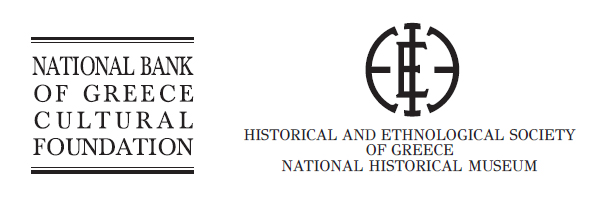
“Raiment” as an expression of the soul
The exhibition of photographer Vangelis Kyris and embroidery artist Anatoli Georgiev is precisely that: an expression of the soul of people, in the macro- and microhistory of Greek society.
Undertaking the research, selection, and curation of the raiments that enriched Thessaloniki’s exhibition, was also a journey for SYMVOLI to the history of the land, its historical figures, the stories of societies, and everyday life.
Thanks to the Papageorgiou Foundation, we were honoured to coordinate, on all levels, a unique exhibition!
Watch the video to explore the narrative of this exhibition through the art of photography and embroidery, time and space, and be reminded of the diverse past of Greece through a medium familiar to all: the raiment.
[at 3:00 of the video is also SYMVOLI’s testimonial about exhibition research!]
———
6 September 2024 – 6 January 2025 | Villa Kapantzi
An initiative of the Papageorgiou Foundation, with the cooperation of the Μορφωτικό Ίδρυμα Εθνικής Τραπέζης – ΜΙΕΤ National Bank of Greece Cultural Foundation.
Under the auspices of the A.E. of the President Greece, Katerina Sakellaropoulou.

The exhibition that enchanted the audience of Athens, came to Thessaloniki enriched with new works of unique costumes of Macedonia and Thrace, an initiative of the Papageorgiou Foundation
From September 6, 2024 to January 6, 2025, on the initiative of the Papageorgiou Foundation and with the cooperation of the National Bank of Greece Cultural Foundation, the enriched emblematic exhibition entitled “Clothing of the Soul”, is presented at the Thessaloniki Branch of MIET / Villa Kapantzi, under the auspices of the A.E. of the President of the Republic Katerina Sakellaropoulou.
After the exhibition’s journey in Greece and abroad*, and the unique response of the public in all destinations, and especially in the Acropolis Museum, where it was held in the context of the celebrations of the 200th anniversary of the Greek Revolution of 1821, the “Garment of the Soul” came to Thessaloniki. This is a unique exhibition, where photographer Vangelis Kyris and embroidery artist Anatoly Georgiev present the “Greek garment” in a special way and with an artistic perspective, worn by contemporary people, and through the osmosis of photography with fabric and embroidery.
In the exhibition, presented for four months in the city of Thessaloniki, more than 70 costumes of the past “dress” faces of the present, in a unique connection that highlights the richness, the imaginative variety, the mastery of details, the manufacturing skill of the garments. At the same time, through the penetrating gaze, the posture and movement of the body, the costumes become the narrative of the history of the place, the historical persons, the stories of the societies and their everyday life.
As the creator and photographer Vangelis Kyris writes “With a four square frame map as a background, I wanted to travel in space and time, where Hellenism is blossoming. Through the eyes I wanted to reach the soul and Anatoli with his embroidery, to give life to the material. A journey and this too from the depths of the soul to the three-dimensionality of matter, keeping the plane of the photograph as the centre”.
On the initiative to hold the exhibition in Thessaloniki, the President of the Papageorgiou Foundation, George N. Papageorgiou, said: “This exhibition presents clothing as an expression of the soul. The exhibition “Clothing as an expression of the soul of people, in the macro and micro history of Greek society. From the very first moment, this particular work has stimulated the interest of the Papageorgiou Foundation in the enrichment and re-presentation of the exhibition in the city of Thessaloniki”. The Papageorgiou Foundation, sensitive to issues of health, education and science, as well as art/culture, took the initiative not only to present the exhibition in Northern Greece, but also to highlight the cultural heritage and tradition of the region by researching, searching for and photographing new material, creating works-exhibits from Macedonia and Thrace, as well as works indicative of the multicultural identity of Thessaloniki of past centuries.
This initiative, beyond the basis of the initial presentation with costumes from the collections of the National Historical Museum, the Historical Museum of Crete and the Lyceum of Greek Women of Heraklion, was accompanied by a substantial partnership of institutions from Thessaloniki and Northern Greece: The Foundation of the Museum of the Macedonian Struggle and the Modern History of Macedonia, the Jewish Community and the Jewish Museum of Thessaloniki, the Folklore and Ethnological Museum of Macedonia-Thrace, the Lyceum of Hellenes of Thessaloniki, the Lyceum of the Hellenic Women of Naoussa and the Folklore Dance Club of Chanthi, opened the showcases, cabinets and the memory of the local communities they represent, in order to enable the composition of the exhibition with the new exhibits.
![]()
ORGANISER

WITH THE COLLABORATION OF

WITH THE SUPPORT OF

COORDINATION/PRODUCTION

WITH THE VALUABLE CONTRIBUTION OF





